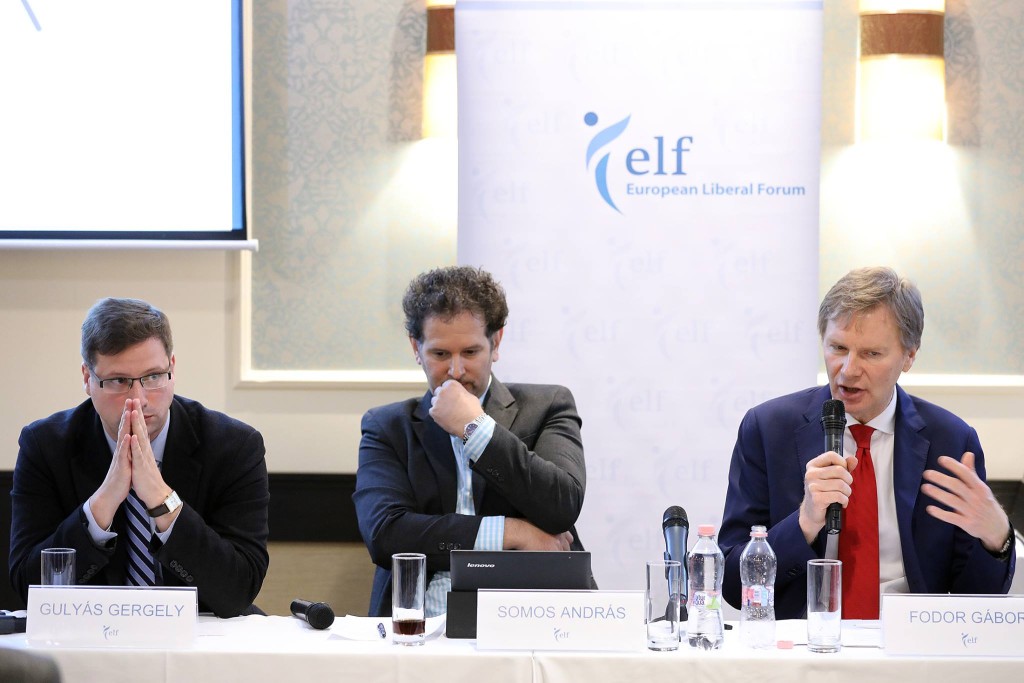With the recent rise of populism and great popluarity of populist politicians in Western European countries, it is more urgent than ever to talk about the fact that the hours of liberal democracies are numbered. However, with the help of the Political Capital, the European Liberal Forum has recently published a study (DOWNLOAD: Liberalism Development Report_2016) that shows a different, more optimistic picture.
The study clarifies there are significant differences between the position of liberal parties and liberal attitudes in different European states: negative results may be found, but in many countries there is a significant chance of the increase of liberalism. What is the status of liberalism in Hungary and in Europe? What illiberal trends can be observed in respective countries? How do politicians in each state react to these changes? These were the starting points of the conference which was held at the end of November 2017 in Budapest.
The conference was opened by Csaba Tóth, Director of the Strategic Institute at Republikon. In his speech, he drew attention to today’s paradoxical situation of liberalism, which is believed to be both missing and in control of everything. This was followed by greeting by Jeroen Dobber, Program Officer of European Liberal Forum. The conference began with Péter Krekó, executive director of Political Capital, who presented the Liberalism Development Report_2016 of ELF.
The presentation starte with an overview of the methodology, goals, and results of the research. If we look at the dynamics of the index on the national levels, we can see that it changes hectically, based on the domestic developments. This can be good and bad news for liberal forces. The demand for liberalism can rise in the countries where it is currently on a pretty low level. But also, the attractiveness of liberal values can quickly decline in countries where liberalism seemed to perform well.
Creativity, freedom, equality before the law, and (to a certain extent) pluralism unite Europe. When it comes to these basic values, the overwhelming majority of societies (above 60%) are supportive of them. On the other hand, tolerance towards LGBT and ethnic groups is a highly and increasingly divisive issue. The final part of the report proposes genereal strategies for liberal political players, such as targeting the youngsters, focusing on education, etc.
Following the presentation, a round-table debate took place, in which the participants expressed their views on the topic in connection with the presentation. András Stumpf, senior employee of Heti Válasz, expressed concern about the accuracy of the questions asked. According to Péter Krekó, this is not a problem, since one of the goals was to make the questions universal. Andrea Virág, an analyst at the Republikon Institute, and Gergely Rajnai, member of the Méltányosság Politikaelemző Institute, pointed out that the research was aiming at basic liberal values so the questions were corresponding. They then evaluated the results and the position of liberalism.
Arguably, the conference’s most awaited part for the audience and the Hungarian press was the debate between Gergely Gulyás, Head of the Fidesz faction in the Hungarian Parliament, and Gábor Fodor, the founder of the Hungarian Liberal Party. Excitement was high since it is uncommon to see a person from the Fidesz government sit next to an opposition figure and have an open debate on professional grounds.
Gábor Fodor argued that liberal values are embedded in Hungarian way of thinking, politics, even if we deny it. He criticized many of the government activities, in particular the hate campaign surrounding the refugee crisis, which in the end will have a detrimental effect on the Hungarian society. Although Gergely Gulyás agreed with the importance of liberal values, he considers the activities undertaken by the goverment to be absolutely necessery.



